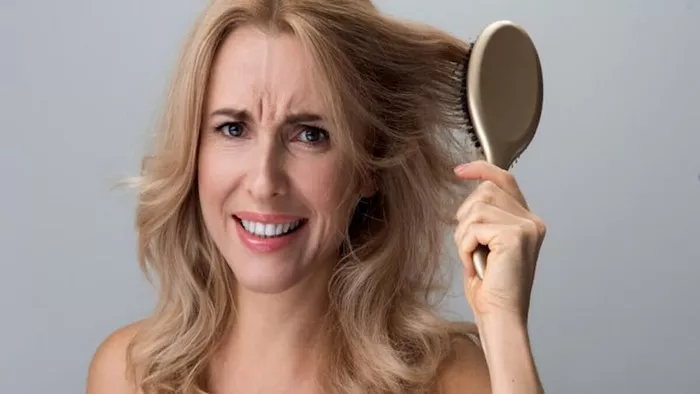Menopause is a natural biological process that marks the end of a woman’s reproductive years, typically occurring in their late 40s or early 50s. One of the many changes that women may experience during menopause is hair loss, which can be distressing and impact self-esteem. Understanding the underlying causes and adopting effective strategies to prevent or minimize hair loss is crucial for maintaining healthy hair during this transition.
Causes of Hair Loss During Menopause
Hormonal changes are the primary culprits behind menopausal hair loss. The significant decline in estrogen and progesterone levels during menopause affects the hair growth cycle. Estrogen and progesterone play a vital role in keeping hair in the growth phase (anagen phase) for a longer duration. When these hormone levels drop, hair follicles shrink, and the hair enters the resting phase (telogen phase) sooner, leading to increased shedding and thinning.
Additionally, the relative increase in androgen levels (male hormones) can contribute to hair loss. Androgens, such as testosterone, can cause hair follicles to shrink, resulting in shorter and finer hair. This type of hair loss, known as androgenetic alopecia, is characterized by thinning hair on the crown and frontal scalp.
Identifying the Symptoms of Menopausal Hair Loss
Recognizing the signs of menopausal hair loss is essential for early intervention. Common symptoms include:
- Gradual thinning of hair, especially on the top of the head and at the hairline.
- Increased hair shedding during brushing or washing.
- Wider parting or more visible scalp.
- Hair becoming finer and less voluminous.
If you notice these symptoms, it’s important to consult a healthcare professional or dermatologist to rule out other potential causes of hair loss and develop an appropriate treatment plan.
Effective Strategies to Stop Hair Loss During Menopause
1. Maintain a Balanced Diet
A nutrient-rich diet is essential for healthy hair growth. Ensure your diet includes:
- Protein: Hair is primarily made of keratin, a type of protein. Include lean meats, fish, eggs, beans, and nuts in your diet.
- Iron: Iron deficiency can lead to hair loss. Incorporate iron-rich foods like spinach, lentils, and red meat.
- Vitamins and Minerals: Vitamins A, C, D, E, and B-complex vitamins, along with zinc and selenium, are crucial for hair health. Consume a variety of fruits, vegetables, whole grains, and nuts.
2. Hormone Replacement Therapy (HRT)
Hormone Replacement Therapy can help alleviate menopausal symptoms, including hair loss, by restoring hormonal balance. HRT involves taking medications containing estrogen and progesterone. However, HRT may not be suitable for everyone, and it is important to discuss the risks and benefits with your healthcare provider.
3. Topical Treatments
Topical treatments, such as minoxidil, are FDA-approved for treating hair loss. Minoxidil stimulates hair follicles and prolongs the growth phase, helping to regrow hair and prevent further loss. It is available over-the-counter in various formulations, including foam and liquid.
4. Stress Management
Stress can exacerbate hair loss. Practicing stress-reducing techniques, such as yoga, meditation, deep breathing exercises, and regular physical activity, can help manage stress levels and promote overall well-being.
See Also: How to Prevent Hair Loss After VSG: Things You Need To Know
5. Gentle Hair Care Practices
Adopting gentle hair care practices can minimize hair damage and breakage. Consider the following tips:
- Avoid excessive heat styling and chemical treatments.
- Use a wide-tooth comb to detangle wet hair.
- Opt for sulfate-free shampoos and conditioners that are gentle on the scalp.
- Avoid tight hairstyles that pull on the hair.
6. Supplements
Supplements can complement a healthy diet and address specific nutrient deficiencies that may contribute to hair loss. Common supplements for hair health include:
- Biotin: A B-vitamin that supports hair growth and strength.
- Vitamin D: Deficiency in vitamin D has been linked to hair loss. Ensure adequate sun exposure or consider supplements.
- Omega-3 Fatty Acids: Found in fish oil, these promote scalp health and reduce inflammation.
7. Scalp Massage
Regular scalp massage can improve blood circulation to the hair follicles, promoting hair growth. Use gentle circular motions with your fingertips to massage your scalp for a few minutes each day.
8. Medical Treatments
For severe cases of hair loss, medical treatments such as low-level laser therapy (LLLT) and platelet-rich plasma (PRP) therapy may be recommended. LLLT uses light energy to stimulate hair follicles, while PRP therapy involves injecting a concentration of the patient’s own platelets to promote hair growth.
9. Natural Remedies
Some natural remedies may help reduce hair loss and improve hair health. These include:
- Aloe Vera: Known for its soothing properties, aloe vera can reduce scalp inflammation and promote hair growth.
- Essential Oils: Oils like rosemary, lavender, and peppermint have been shown to improve hair thickness and growth. Dilute essential oils with a carrier oil and apply to the scalp.
10. Regular Check-Ups
Regular check-ups with your healthcare provider can help monitor your overall health and address any underlying conditions that may contribute to hair loss. Conditions such as thyroid disorders, anemia, and autoimmune diseases can impact hair health and should be managed appropriately.
When to Seek Professional Help
If you experience significant hair loss or if over-the-counter treatments and lifestyle changes do not yield satisfactory results, it’s important to seek professional help. A dermatologist or trichologist can conduct a thorough examination, perform necessary tests, and recommend personalized treatment options based on your specific needs.
Conclusion
Menopausal hair loss can be a challenging experience, but with the right approach, it is possible to manage and reduce hair loss effectively. By maintaining a balanced diet, considering hormone replacement therapy, using topical treatments, managing stress, adopting gentle hair care practices, taking supplements, and exploring natural remedies, you can support your hair health during menopause. Remember to consult with healthcare professionals to develop a tailored plan that addresses your unique situation and needs. With patience and persistence, you can navigate menopausal hair loss and maintain healthy, vibrant hair.


